The University of Michigan’s Ross School of Business recently celebrated 25 years of Multidisciplinary Action Projects (MAPs), an action-based learning course for first-year MBA students who receive guidance from faculty advisers. During that span, 10,438 full-time MBA students have worked on 2,010 projects in 92 countries with 1,352 sponsor companies. In recent years, executive, evening and weekend MBA students have participated in MAPs as well.

WDI began sponsoring international MAP projects for Ross in 1992, the year after they began, and have funded and provided faculty advisers for about 225 projects in the 24 years since. WDI President Paul Clyde said MAPs are “one of many tools available to pursue our mission” to develop knowledge and capability that improves the effectiveness of firms and social welfare in emerging economies.
“We’re using it in specific initiatives as a way of building relationships and developing solutions in the field with our partners,” he said. “For us, MAPs aren’t an isolated event, they are part of a longer-term relationship.”
WDI Senior Research Fellow Ted London said MAPs not only benefit students and sponsoring organizations, but also faculty members who advise the projects. It is a valuable way to keep in touch with multiple organizations, understand their latest successes and roadblocks, and think more broadly about solutions.
“I enjoy MAP so much, in part, because it gives me the opportunity to listen and learn,” said London, who also is vice president of WDI’s Scaling Impact Initiative. “These are often organizations we have worked with for many years and it’s great to have another reason for a frank and in-depth engagement.”
Each MAP project requires analytical rigor, critical thinking, and teamwork from the students. Teams of 4-6 students spend seven weeks exclusively working on their MAP projects, including 3-4 weeks in the field. Sponsors receive top-notch deliverables and data-driven recommendations from the team.
After learning about their projects and conducting research in the classroom for several weeks, the students then spend three to four weeks working alongside their project sponsors in the field.
Clyde, who served as an adviser to his first MAP team in 1998 while on the faculty at Ross, said the student projects are a “fun way to teach.”
“Something always comes up that’s an illustration of a point made in their core courses,” he said. “I distinctly remember times when you could see the lightbulb go off and they suddenly understood the concept because they were in that setting, they were living it in the field.”
WDI’s Education Initiative recently began deploying MAP teams to help further its mission of identifying and sharing new ways to enhance management education in emerging markets. This past winter, two MAP teams worked on entrepreneurship projects in Kosovo and Morocco, and one team examined e-learning at a major technical university in Georgia.
“MAP teams allow us to offer our education partners in-depth strategic guidance and for us to be able to consolidate learnings across projects and thereby identify needs, trends, and best practices in management education,” said Amy Gillett, vice president of the Education Initiative. “The projects we’ve sourced related to entrepreneurship education are helping us develop new models and tools to share with a global audience through WDI’s new Entrepreneurship Development Center for emerging markets.”
London, who has been a faculty adviser to about 50 student teams since joining WDI in 2004, called MAPs a “virtuous cycle” that benefits students, WDI’s partners, and the institute’s research.
MAPs embed students with an organization, whether it’s a nonprofit or a corporation, and apply what they have learned in school to help solve an issue the organization is facing.
“They’re solving real problems and understanding the context,” London said “They’re on the ground 3-5 weeks so they have a chance to get acclimated and then really get engaged.”
Clyde said MAPs also are an opportunity for students “to learn how to work in a team setting, to test out their leadership skills, and learn about other cultures.”
Benefitting Organizations, Influencing Students
Allie Schachter was a member of a MAP team that worked with a company interested in rolling out an active learning platform in an emerging market context. Managed by WDI’s Education Initiative, Schachter and her team embedded with the Stockholm School of Economics in Riga, Latvia. Schachter said she enjoyed applying what she had learned in the classroom to a real-world business problem. (Watch a video of Schachter talking about the MAP project below).
“My MAP experience solidified and contextualized many of the concepts discussed in class, which was an incomparable educational experience,” she said. “It was a great opportunity to work with a group on a very large and involved project. Throughout the course of our project, we honed our ability to work together, delegated tasks to one another, and navigated difficult conversations and challenges together.
“It was a really great opportunity to gain experience working for and with others. I will certainly carry those experiences forward when working with teams at work and in future classes.”
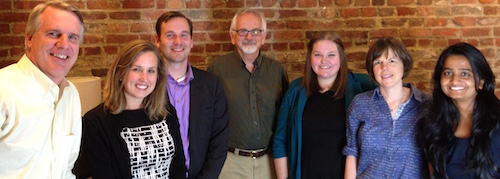
Perry Samson, center, poses with WDI President Paul Clyde, left, WDI Vice President of the Education Initiative Amy Gillett, second from right, and MAP team members.
Perry Samson, the Arthur Thurnau Professor in the Department of Atmospheric, Oceanic, and Space Sciences at the University of Michigan, developed the learning platform and enjoyed working with the MAP students to see how his product performed in an international setting. He called it “invigorating” and a “wonderful interaction” with the students, who were “thinking more deeply about all these things.”
“They thought of a number of things I didn’t think of,” he said. “They provided good insight on what drives adoption of technology in education and identified a number of suggested process changes.”

Diana Pauna
Diana Pauna, former pro-rector of the Stockholm School of Economics in Riga, found the project very useful for her university. She and her colleagues and students valued the opportunity to interact with a highly engaged team of MBA students from the University of Michigan.
“The project was extremely successful and a good learning experience for us,” she said.
London said because the MAPs are sourced with WDI partners, he and others are able to structure a good project that challenges students and benefits the organization.
“MAPs are of real value to the partners,” he said. “They do come back year after year. It’s a pressing issue they’re very keen to solve. Generally they have great outputs and create a substantial amount for the partners. That’s the reason we have a lot of repeats over the years.”
London and Clyde said MAPs can impact organizations for years to come, and can be life changing for students. London said MAP projects give students “an opportunity to see how the majority of the world lives and transacts, and it is something I believe they will carry with them the rest of their lives.”
He said one of the pleasures he gets from traveling with the students is watching them grow from the experience. Some students are committed to working internationally after graduation and have already traveled overseas. But others who will likely live and work in the U.S. when their MBA studies are complete still want to work internationally at least once.
“This isn’t what they are going to do with their life but it is something they want to experience,” London said. “We take them places and expose them to things they might not necessarily ever be exposed to. When we’re in Uganda, we’re not necessarily staying in the capital city. When we’re in Benin, we’re out in the bush.
“You can see the trepidation in some of them before they leave, and a sense of confidence when they get back,” he said. “And a whole new awareness of this world.”
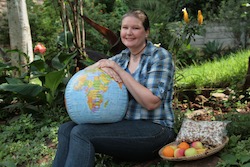
Former WDI MAP team member and WDI summer intern Patricia Griffin.
One student whose MAP experience changed her career path was Patricia Griffin, who was certain she would work for a U.S. automaker in a domestic car plant after getting her MBA. But she decided to join a WDI-sponsored MAP team headed by Clyde and that would work with a Uganda hospital.
Clyde remembers the team functioned without electricity for the first two weeks of its four-week stay. He said it was tough on the team but Griffin was energized by her experience and instead of heading to the auto plant now lives and works full time in Kenya.
“Questioning my assumptions and taking nothing for granted has become a basic mode of operation for how I conduct my career and life,” Griffin said of her time in Uganda. “That’s a direct result of the MAP experience.”
(Click here to watch Rustam Sengupta’s Nov. 30 classroom presentation.)

(Find out more about the about the Boond technology in the company-produced video below):
Sengupta was invited to speak by WDI Senior Research Fellow Ted London, who was introduced by a former U-M student. Sengupta was aware of the base of the pyramid (BoP) work London and WDI have done over the years and was eager to connect.
“In getting to know Rustam and his enterprise, Boond, what has struck me is both the innovation in their technology and the learning process the leadership team has enabled to build their business model,” said London, who also is vice president of WDI’s Scaling Impact Initiative. “They are putting together a very interesting model to address a major challenge – providing energy in rural India – and they are now focused on taking this scale. Rustam is very open about sharing his learnings and the challenges ahead, which should make this a terrific interactive session and learning opportunity. I am delighted he is here from India to share with us”
The title of Sengupta’s talk is, “Scaling Enterprise with Compassion – Energizing Rural India One Village at a Time.”
He has a master’s degree in Electrical Engineering from the University of California, Irvine and an MBA from INSEAD. He has worked for Standard Chartered Bank in Singapore, Deloitte Consulting in the U.S., and ICOS Vision Systems in Belgium. He founded Boond in 2010.
In India, about 94 percent of those living in urban areas have electricity compared with 67 percent of people living in the rural parts of the country. An estimated 304 million people do not have access to electricity, the most of any country in the world.
London said Sengupta’s talk at Ross has a lot to offer for students. For those interested in working internationally in the field, “he has a lot of interesting lessons about success, about challenges, about what works and what doesn’t work.”
For students thinking about starting their own social enterprise, London said Sengupta “will certainly share the struggles and the excitement of building your own enterprise.”
And for those interested in clean energy solutions, Boond’s distributed model “has a chance to scale, and that could have implications in the developing world and the developed world,” London said.
In an article published in the November 2016 issue of ISE Magazine, WDI’s Ted London and Colm Fay discuss how standardized frameworks can help create sustainable businesses for the base of the pyramid in developing countries.
This article is provided with permission of the Institute of Industrial and Systems Engineers from the November 2016 issue of ISE, Copyright©2016 Institute of Industrial and Systems Engineers. All rights reserved.
The co-founder of a start-up venture in South Africa that aims to save the honey bee will share how he designed the initiative to have economic, social and environmental impact as part of the WDI Global Impact Speaker Series. The talk begins at 5 p.m., Nov. 16 in room R2230 at the Ross School of Business, and is free and open to the public.
(Click here to watch Madison Ayer’s Nov. 16 classroom presentation.)
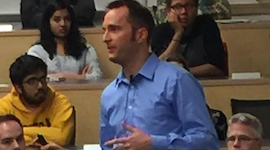
Madison Ayer, who has led several social ventures in Africa, including Honey Care Africa and Farm Shop, will discuss what he learned from those enterprises to launch Mbuyu Group, a large-scale honey bee conservation initiative. Mbuyu Group is working with South African National Parks to protect some of the world’s most critical honey bee ecosystems and strengthen the bee population. The group also hopes to become one of the largest global producers of organic honey.
Ayer has been featured in the WDI speaker series in the past. Last year, he talked about Honey Care Africa and Farm Shop, two ventures in Kenya that serve those living at the base of the pyramid.
Honey Care Africa provides smallholder farmers with beehives and harvest management services. In addition, it guarantees a market for the beekeeper’s honey at fair trade prices, helping to provide a steady, consistent source of income.
Farm Shop recruits and trains franchisees who then independently operate community-level, agro-dealer shops that supply smallholder farmers with seeds, fertilizers, tools, veterinary medicines and other items to improve crop yields.
In his 2015 talk, Ayer discussed the challenges that come with integrating low-income producers and consumers into the supply chain, including poor infrastructure, security concerns, informal regulations, and high costs. But if successful in overcoming these hurdles, Ayer said it can lead to long-term competitive advantage and positive economic impact on communities across the supply chain.
Watch Ayer’s 2015 presentation here and his interview with WDI Senior Research Fellow Ted London below:
In addition to his previous talks, Ayer also has engaged with WDI’s Scaling Impact Initiative and the Performance Measurement Initiative (PMI).
As part of a project funded by the German development agency GIZ, WDI studied the landscape of BoP facilitators in the sub-Saharan Africa region. The Scaling Impact initiative conducted field visits to Ethiopia and Kenya – including to Honey Care Africa and Farm Shop.
WDI’s Performance Measurement Initiative team also conducted a qualitative impact assessment in 2012 to identify Honey Care’s impact in alleviating poverty on children age eight years and younger, and developed a case study as part of the series entitled Focusing on the Next Generation: An Exploration of Enterprise Poverty Impacts on Children. The goal of the series, funded by the Bernard Van Leer Foundation, was to gain a greater understanding of the ways in which businesses in emerging markets impact young children’s lives and the potential to optimize impact on children.
Additionally, WDI Publishing also produced a popular teaching case study on Honey Care Africa that examined the business’s transition from obligating farmers to maintain their own hives to providing hive management services. The case also explored ways to enhance this new model, including strategies to reduce side selling. It was written by London and Heather Esper, senior program manager of PMI.
Amy Gillett discusses development through entrepreneurship in an interview on enterprises’ role in alleviating poverty in the newsletter of Education partner Pontis Foundation.
After graduating from the University of Texas, Patrick Huang began his career as a management consultant while giving free advice to social entrepreneurs in emerging markets. But he soon wanted to do much more than dole out advice on the side, so Huang decided to get his MBA and join a social impact enterprise in an emerging market.
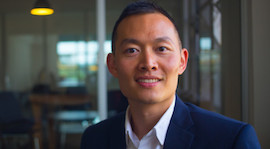
The Ross School of Business at the University of Michigan was at the top of Huang’s list of graduate schools, and “WDI was one of the key reasons,” he said.
“Ross and WDI stood out when I was applying because of its dedicated focus on the (base of the pyramid) in emerging markets through thought leadership and opportunities for students to engage directly in emerging markets through (student projects) and internships,” said Huang, now working with a startup enterprise in Kenya.
He enrolled at Michigan Ross in fall 2011 and that winter took part in a WDI-sponsored Multidisciplinary Action Project (MAP), an action-based learning course in which students work for a company or organization on a special task.
He was part of a four-person team working for the nonprofit charity CARE in Bangladesh, which was tasked with developing a micro-franchise pilot for small-scale businesses that sell agricultural inputs such as seed and medicine for livestock. The business plan included consolidation and coordination to improve efficiencies at the companies.
The team worked in a small farming town a few hours outside the capital of Dhaka. They often sat in huts and interviewed farmers and business owners.
“Although our team and our interviewees came from different sides of the world, we found common ground as we came to understand their challenges, their struggles, and most importantly, their ambitions for a better life,” Huang said.
That summer, he traveled to Mumbai, India as a WDI intern working for Village Capital, a peer-led business accelerator and investment program for early-stage social enterprises. Village Capital was planning to start two business accelerator programs, one focused on enterprises based in Mumbai and another sector-specific program for enterprises across India. Huang’s job was to recruit interested and qualified social enterprises across India to the program.

Huang poses with an elephant during his internship in India.
Huang soon discovered he not only had a knack for identifying potential businesses, he enjoyed it. He met with budding business owners, angel investors, and entrepreneur associations. He would meet them for coffee at a local cafe or for drinks during happy hour. He learned about each enterprise’s team, its business model and plans for growth.
“At the same time, I also learned about the city, the people, the culture,” he said. “I traveled across India from historical sights like the Taj Mahal to tea plantations in Kerala, absorbing and trying as much as I could. I sought to not only identify prospective businesses but also refine my own interests.”
By summer’s end, Huang had conducted preliminary due diligence and created a pipeline of 45 prospective early-stage, social enterprises.
“More importantly, I knew that I wanted to work in this environment where the growth of the entire country was almost tangible,” he said.
After graduating in 2013, Huang moved to Nairobi to work as a consultant for small- and medium-sized enterprises (SMEs). He now is chief of staff and principal business development officer at Umati Capital, a financial technology startup that provides financing alternatives for SMEs in agri-business, retail suppliers and consumer goods manufacturers in East Africa.
He said his WDI internship and MAP experiences “refined and strengthened my current passion for entrepreneurship as the driver for economic growth in emerging markets.” He also identified his role in this field – finding areas of collaboration and opportunity.
But to accomplish this with prospective clients in Kenya, he thought back to what he learned during those meetings over coffee in Mumbai and the interviews with farmers in their huts in Bangladesh. What made those projects succeed was Huang’s humility and empathy when interacting with people from a different culture or background. He also practiced “active listening” to show he was attentive and striving to understand. These are traits he applies in his work today.
“Only by understanding these lessons could I identify the common ground that served as our foundation to work together and achieve a common goal,” he said. “With my Ross MBA and my experiences at WDI, I am grateful for that opportunity, and look forward to working with businesses that can generate value for both the shareholders and the society as a whole.”
Note: This is one in an ongoing series of articles profiling past WDI interns and Multidisciplinary Action Project (MAP) team members and their career paths. Additional profiles in the series may be found here.
Ted London, vice president and senior research fellow of WDI’s Scaling Impact Initiative, has dedicated his career to exploring the role of business in alleviating poverty, particularly with respect to the base of the pyramid (BoP), defined as the 4-5 billion people who live on less than $3,000 per year. A key focus of his work is sharing what he has learned with aspiring entrepreneurs and future venture leaders through his MBA course, Business Strategies for the Base of the Pyramid, at the University of Michigan’s Ross School of Business.
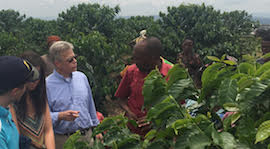
In recognition of his impact, London has been named an Aspen Faculty Pioneer Award winner, given to innovative business professors teaching about the most pressing “grand challenges” faced by society today. London’s award also includes a “Building the Field” distinction that honors his long-term influence on building the BoP domain and shaping the next generation of business leaders.
Watch a video of London talking about his work here.
The awards, handed out by the Aspen Institute Business and Society Program, were established in 1999 to honor educators who exhibit leadership and risk-taking, and develop curriculum that studies the relationships between capital markets, firms and the public good. The Aspen Institute is an educational and policy study organization that provides a nonpartisan venue for dealing with critical issues.
“This year’s Faculty Pioneers are leading the charge toward a more modern version of business education,” said Claire Preisser, who manages the Faculty Pioneer selection process as associate director of the Aspen Institute Business and Society Program. “Against the backdrop of society’s ever-increasing expectation of firms, business education is still organized around preparing students to be profit maximizers – focusing them on financial, largely short-term measures of business success. Instead, our award winners equip students with the kind of problem-solving skills that firms need to make a positive impact on the most pressing issues of our time.”
London said he was humbled by the award and heartened to see his work in the BoP domain recognized.
“Our students seek to harness the power of enterprise to address society’s grand challenges, including poverty and inequity faced by the base of the pyramid,” London said. “Now more than ever, these students want strategies, frameworks and processes that guide and drive action. They also need to appreciate the unique opportunities and challenges of operating an enterprise in this demanding market environment.
“My goal is to provide them with both an action-oriented toolkit and the contextual knowledge needed to build scalable businesses with substantial social impact.”
His latest book, “The Base of the Pyramid Promise: Building Businesses with Impact and Scale,” was released earlier this year. WDI Publishing has also published many of his case studies.
In addition to London, Andrew J. Hoffman, Holcim (US) Professor of Sustainable Enterprise at Michigan Ross, was named a Faculty Pioneer Award winner. Hoffman and his graduate students have also authored many case studies found on the WDI Publishing website.
WDI’s Performance Measurement Initiative is partnering with the Inter-American Development Bank (IDB) to pilot test a new framework for boosting the impact of small inclusive businesses and their distribution networks in Brazil, Nicaragua, and Peru.

Heather Esper, senior program manager of WDI’s Performance Measurement Initiative (PMI), developed the framework for IDB’s SCALA network, a platform to scale the impacts of inclusive and social business in Latin America and the Caribbean. Through SCALA, anchor companies, microfinance institutions, academia, and non-governmental organizations combine efforts to grow micro‐distribution networks based on micro-franchising models. Those models in turn provide business opportunities and access to products and services to those living at the base of the economic pyramid.
Esper first presented the SCALA metrics framework at a conference last year in Mexico which includes a mix of standardized social and business metrics over the short and long term. These indicators can be tailored to each organization in the network. Over time, the framework reveals the impact each venture is having on the micro-distributors, the people SCALA aims to help.
Following the Mexico conference, there was great interest in having WDI’s PMI team pilot the framework with different micro-distribution organizations in SCALA’s network. The goal of piloting is to test and refine the framework, as well as gauge how well these ventures improve the lives of their micro-distributors. The pilot also will inform best practices for other organizations within SCALA to adapt and implement the framework to assess their impacts in Brazil, Nicaragua, and Peru.
“SCALA would like everyone in the network to use this standardized framework,” Esper said. “We’re working closely with three organizations to pilot the framework in order to assess how easy or difficult it is for them to use. We also want to examine how it creates value for the organizations – such as informing decision-making – in order to refine the framework and develop training materials for the roll out of the framework to the rest of the network.”
The three organizations that are part of the pilot are:
Starting in May, Esper and her PMI colleagues Yaquta Kanchwala Fatehi, PMI senior research associate, and Becca Baylor, PMI research associate, adapted the framework presented in Mexico City to each organization by identifying context-specific indicators for each venture that would properly reflect the impact on the micro-distributors, and developed a data collection process plan.
The team is currently developing surveys for the three organizations, which will include a pre-test, and once complete will focus then on collecting the data, analyzing it, and writing a final report that shares the lessons learned during the pilot in addition to reporting on the findings and methodology. Esper and Baylor will travel to Peru in September to pretest the survey with Chakipi.
“We aim to compare these standardized indicators across the three organizations for the final assessment,” Esper said.
Before the pilot is completed in February 2017, Esper and Baylor will share the progress to date at the SCALA annual meeting in Cali, Colombia in October.
There are many benefits if all organizations within SCALA used the same assessment framework, Esper said.
“If all organizations within SCALA are collecting the same metrics, then learning across organizations can be improved,” she said. “There would be more systematic learning between organizations if they report these standardized indicators annually to SCALA. For instance, this work can lay the foundation for SCALA to better predict client loyalty, distributor growth capacity, as well as address vulnerabilities across the value chain. SCALA can also aggregate the findings and make a business case about the impacts of the micro-distribution model and the value of the network to the broader community.”
The William Davidson Institute’s (WDI’s) Scaling Impact initiative (SI) has completed its first year with a sharpened focus on assisting enterprises achieve scale in base of the pyramid markets, while completing several in-depth projects for building a toolkit of strategies, frameworks, and processes for business and the development community.
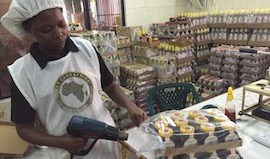
Under the management of Ted London, vice president of the SI initiative and WDI senior research fellow, the SI team has partnered with multinational corporations, global development agencies, non-profit organizations, and small- and medium-sized enterprises to grow their operations with the overarching goal of improving the incomes and well-being of low-income populations.
In a newly released video (see below) London explains how the SI initiative, previously known as the Base of the Pyramid (BoP), has evolved over time. WDI has long been a leader in analyzing and developing best practices in the BoP domain, and the SI initiative continues that legacy. But while many enterprises, from large corporations to entrepreneurs, embraced the concepts behind BoP and worked to incorporate low-income people into their business practices, few have achieved scale in meaningful ways. Recognizing this dynamic, the SI initiative was created and designed to help these enterprises manage growth, develop business models and forge partnerships in new ways.
Through extensive field research, customized advising and consulting, and by engaging multiple stakeholders, the SI team has developed a suite of new tools and methodologies tailored to different sectors, geographies and contexts.
“Our approach is what makes us distinct,” London says in the video. “We combine rigorous research with on-the-ground implementation. Working with our partners we identify the most relevant and impactful questions facing enterprises, analyze past successes and failures, and develop practical and actionable solutions.”
By generating new knowledge and translating it into actionable recommendations and strategies, the SI group is enabling partners from both the global development and business worlds. One example of these capabilities was demonstrated through a collaborative effort with one of the world’s largest retailers, Walmart. London and SI initiative Research Manager Colm Fay chronicled the history, the impact and the lessons learned by Walmart in its effort to bring smallholder farmers and female artisans from developing countries into its retail infrastructure in the report: “Incorporating Small Producers into Formal Retail Supply Chains”. Other companies and organizations can benefit from the Walmart experience, as well as from the accompanying Sourcing Readiness Checklist. The tool, created in partnership with Oxford University Consulting, enables organizations to assess sourcing strategies for more inclusive supply chains. The report, checklist and other resources may be downloaded here.
“Instead of asking whether business has a role in alleviating poverty, we look at how business can play this role more effectively,” Fay said. “In our research projects we aim to understand lessons learned and best practices, but also how this learning can be applied on an on-going basis to achieve sustainability and scale.”
Methods for creating partnerships and strategies for leveraging them is another research focus. A recent study by London and Fay, “Partnering for Scale: Collaborating to More Effectively Engage Smallholder Farmers,” offers important insights into how enterprises can enhance their performance through building an effective partnership ecosystem. Based on interviews with entrepreneurial and corporate-led enterprises in the agriculture sector in South Africa and Kenya, the research provides strategies for inclusive businesses looking to transition from an early pilot stage to scale.
Sharing these findings is critical to both the SI group and to WDI. It was the subject of a July 20 featuring London and presented by the Inclusive Business Action Network (IBAN), the World Business Council for Sustainable Development (WBCSD), and WDI. To watch a replay of the webinar, click here.
London also will host a July 28 webinar on Teaching Base of the Pyramid at a Business School. London will share his experiences in incorporating BoP content into one or more sessions within an existing course, or into an entire semester-long class. Leveraging material from his latest book, The Base of the Pyramid Promise, as well as topic-appropriate case studies, London will offer techniques, strategies, and lessons learned to enhance effectiveness in teaching this important topic.
This study was undertaken with the financial support of the Inclusive Business Action Network (IBAN). IBAN is a global multi-stakeholder network enabling and promoting inclusive business worldwide. It is implemented by the Deutsche Gesellschaft für Internationale Zusammenarbeit (GIZ) GmbH on behalf of the German Federal Ministry for Economic Cooperation and Development (BMZ).
The focus of this report is to shed light on the opportunity for inclusive business leaders to leverage partnerships to overcome the challenges they face in seeking sustainability at scale. Our findings, based on interviews with both entrepreneurial and corporate-led enterprises engaging with smallholder farmers in Kenya and South Africa, offer important insights on how these enterprises can enhance their performance through building an effective partnership ecosystem. In particular, we focus on addressing the following two questions for IBs seeking to transition from pilot to scale:
The “who” – Which partners should enterprise leaders prioritize as most crucial to enabling sustainable, scalable inclusive business development?
The “how” – Once these inclusive business leaders have identified their priority partners, what are the strategies and processes they will need to use to develop and maintain these relationships to maximize their effectiveness?